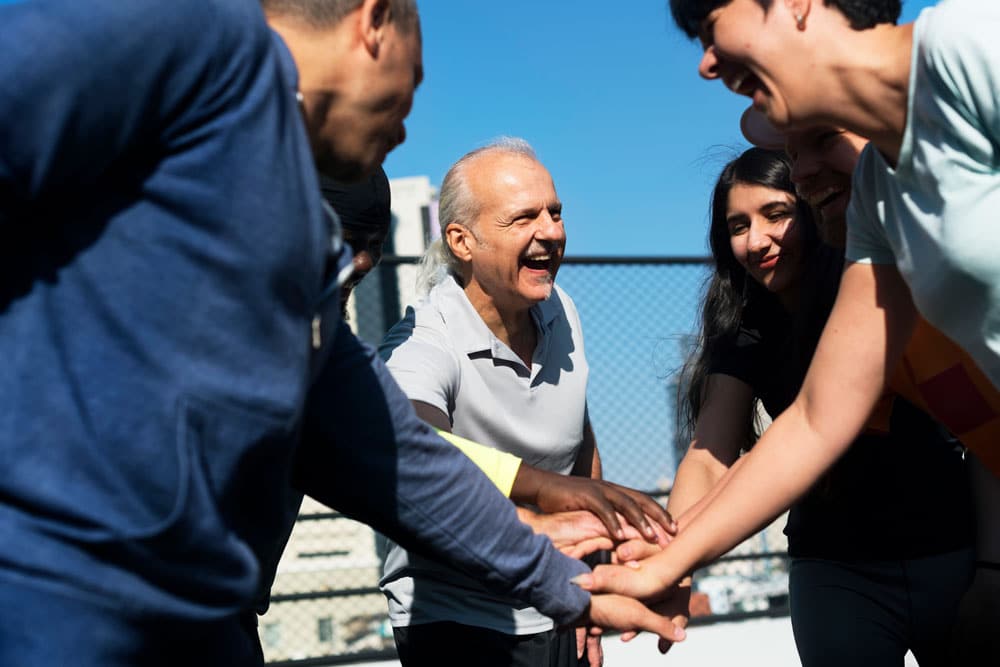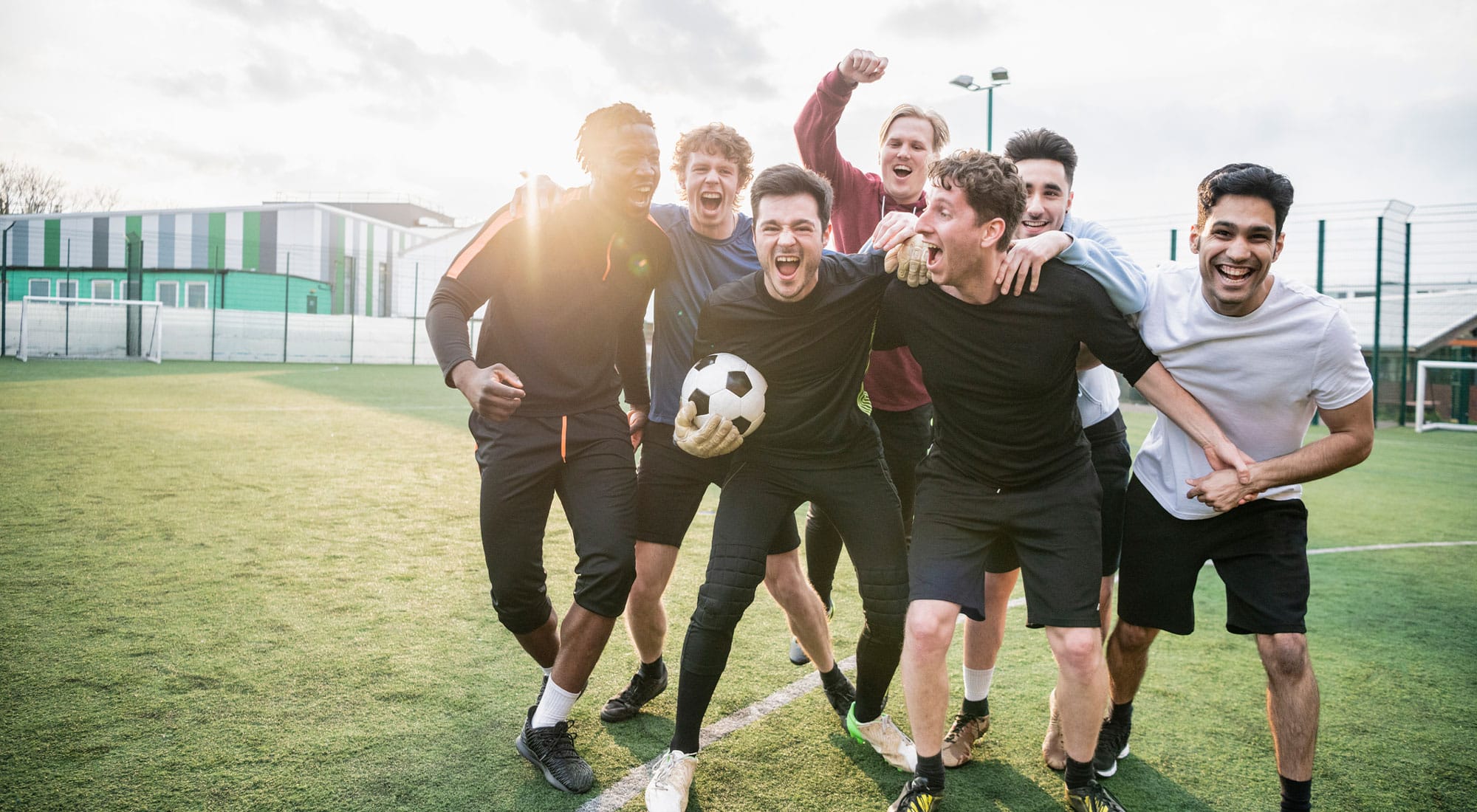By Alanna Hilbink
Sports are continually and globally popular. We sign our kids up for them, gather with friends to play them, and are ready to watch when our favorite teams compete. So what’s the draw? Almost every busy parent has surely asked at one time or another, “are they worth it?” It turns out there may be even more benefits than we know.
Team Sports and Children
It’s never too early to get involved with group sports. Kids are often signed up to expend that seemingly endless energy, but they also experience a lot of mental benefits from being part of a team. JAMA Pediatrics reports that children who play team sports are less likely to ever receive a depression or anxiety diagnosis. Part of the reason for this is that groups provide social support and engagement. This social factor helps explain the difference in the benefits of team sports versus individual sports for children.
Children who play team sports are less likely to ever receive a depression or anxiety diagnosis.
The professional journal PLOS ONE reports that while team sports can reduce anxiety, depression, and social and attention problems in children, individual sports may actually increase concerns like anxiety, while not providing the social benefits of a team. However, individual sports do still have physical and mental health benefits. So if your child enjoys a certain form of physical activity, there’s no wrong way to be active.
Team Sports and Adults
While group sports can be great for children, you don’t have to have played sports as a child to experience the mental benefits of team sports now. The Journal of Sports Science & Medicine (JSSM) says that organized sports participation is associated with “a decreased risk of anxiety, depression, feelings of hopelessness, suicidal ideation, and suicide attempts, illicit drug use, and the smoking of tobacco products.” Looking at this list of the benefits of team sports, it practically sounds like a cure-all.
Team Sports and Staying Active
We know physical activity is vitally important for both our mental and physical health. But staying active can be hard when you have a job, family, and packed schedule that leaves you exhausted. Finding time and energy to walk, run, or go to the gym can be challenging. One of the benefits of team sports versus individual sports is that you don’t have to find the motivation on your own. Playing together can put the focus more on the fun you’re having instead of the exercise you’re getting; plus, you get all the social benefits of team sports at the same time.
Team Sports and Aging
Though it may seem obvious, the physical benefits of playing team sports are present at any age. According to Biogerontology, older people who participate in sports “demonstrate exceptional physical capability for their age.” They usually retain greater bone, muscle, cardiorespiratory, metabolic, and neuronal health compared with those who are nonathletic of similar age. Playing sports keeps you physically healthy, and it has great effects on continued neurological health and cognitive function as you age.
Playing sports keeps you physically healthy, and it has great effects on continued neurological health and cognitive function as you age.
Other Benefits of Team Sports
Believe it or not, you may not even have to play a sport to reap the benefits of team sports. McLean Hospital reports that people who are sports fans have higher self-esteem, compared with those who have no interest in sports. Sports fans were also found to feel more fulfilled in life. This is because watching sports can do the following:
- Help you relax
- Give you a sense of community with your team and fellow fans
- Create a reason to get together and bond with family or friends
- Provide escapism and entertainment
- Let you express frustration, anger, and other emotions in a healthy, safe setting
And Scientific Reports found that older adults who watched sports either in person or on TV had noticeably fewer depression symptoms, although benefits ceased to accumulate after watching a few times a month. So even if you can’t get out and play, you can feel good about occasionally taking some time to relax and enjoy a game.

Sports and Your Mental Health
Despite all of the benefits, it’s worth mentioning that sports aren’t completely harmless or necessarily good for everyone. Athletic activity is of course physical, and comes with associated risk of accidents and injuries, especially full-contact sports like football. And, as with children, adults experience different benefits of team sports versus individual sports. Individual sports come with greater anxieties and fewer social benefits, although JSSM explains that these drawbacks may be balanced out for some by helping develop concentration and self-reliance.
There is also a lot of drinking culture that is linked to and surrounds both watching and playing sports. Game day stereotypically involves drinking and a plethora of ads for beer and liquor. College teams may consider binge drinking part of the team culture. Recreational sports teams often get together after playing and go have a drink or two. It may seem like alcohol is part of the bonding experience, but many of the benefits of playing team sports are negated when it’s included. Luckily, many communities have recovery-oriented or sober teams; if you can’t find one, you can always start your own! You’ll be surprised how many others share your goals and value health and connection over partying.
Physical Activity and Recovery
Participating in team sports, setting individual fitness goals, and having an overall active lifestyle are all positive steps for anyone — and an essential parts of immediate and long-term recovery. Reach out to The Meadows today to learn more about incorporating team sports and physical activity into your personal treatment plan. Recovery can be active, engaging, and, perhaps most importantly, a great source of social support and fun!

